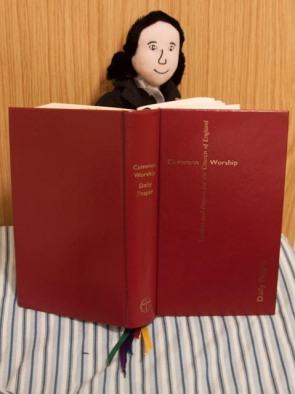I am not sure that anyone would ever call me a stylish person. I try more than some and less than others, but overall I wear what is comfortable and if that happens to include a humorous T-shirt, fun pair of socks, or exciting tie then I am all the more excited. However, when I was thinking about what I was wearing for Baccalaureate It seemed rather significant.
For those who do not know, Baccalaureate is essentially the graduation for Duke Divinity School. Sure I will not technically graduate until Sunday when the President of Duke University and other people say things that few people listen to or remember, but the good part with worship, sermon, and hoods is what we have all been waiting for. For the service there are two required pieces of attire:
1) Black robe–Unlike High School and College there are no required styles of robes. Most people wear the robes they have purchased for leading worship as pastors. I think this makes it that more significant. In Divinity School, we have been working with the end in mind. I know that four years ago when I began the dream I had was to be a pastor standing in front of my congregation and proclaiming the Word of God. Wearing the same robe to graduate that I will wear when I deliver my first sermon as a pastor reminds me that the four years of work that I have put in were not an end in themselves, but were instead a preparation for my future ministry. My particular robe is extra special because it is one that I got for free while I was in England. The Wesley Study Centre where I was studying received the robes and stoles of a former Methodist minister. No one else could fit in the robe and so I got to keep it. It is a very nice (and expensive) robe and I am extremely grateful for it. However, I am even more grateful for what it represents. My time in England was one which reaffirmed my call to ministry and helped me to understand what it was that God was calling me to as a pastor. I am so excited about what God is doing missionally in England and the friends that I made during that year inspire me in so many ways. As I wear my robe in the service as well as in the pulpit I know that they are a part of my story and ministry.
2) Hood–The hoods represent the fact that I have mastered divinity graduated with my masters of divinity. My particular hood is one that I am borrowing from Rev. Chris Brady who was the lead pastor of Living Hope, the new church plant that I was a part of for most of my time at Duke. While Living Hope has been closed by the Bishop, the community that God brought together for that season of my life remains an important part of who I am, and the ways in which I grew as a person and as a pastor will forever mark my ministry. Chris Brady who is now the pastor of Wilson Temple in Raleigh has been my pastor during my entire time at Duke and a generous mentor and friend.
While most people will only see the robe and the hood, for me they represent both the communities that have shaped and formed me in the past, but also the ways in which God has used those people (and countless others) to prepare me for the work that I am called to in the future. If there is one main thing that I have learned in Divinity School it is that ministry is not something that can (or should be) done alone. Without my community here in Durham as well as all over the US and UK I would not be here today. As I cross that chancel area my wife, parents, mother-in-law, and many friends will be sitting in the congregation of Duke Chapel as well as worshipping online and I am so grateful to be able to share with them that moment and the many other ones to come.














 One of the signature questions on almost every Divinity School exam begins like
One of the signature questions on almost every Divinity School exam begins like 